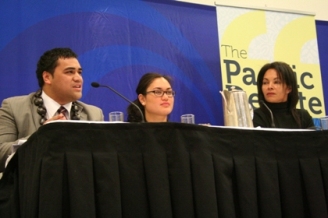
Chen Bei
AUCKLAND (Pacific Scoop/Pacific Media Watch): To urbanise, or not to, that is the question.
A quick poll on Facebook asked seven people from China, Germany, India, Japan, Russia, South Korea and the US: what kind of image comes to mind when talking about Pacific nations like Fiji, PNG, Tonga and Cook Islands?
“Coconut trees,” said Cathy Liu from China. “The serene ocean,” answered Diana Efimova from Russia. None of them failed to give a picture of a tranquil rural setting, where people are living an agricultural life teeming with fruit, fish and crops.
But is the rural landscape on the postcard unchanging?
At a debate last night, a team of Pacific students from the University of Auckland said: “No.”
Their answer also put a question to governments: what should they do if the pattern of rural settlement has changed?
The Pacific Debate at the Rendezvous Hotel was a ten minute walk from Sky City where 13 national leaders were also debating and discussing issues around the Pacific Islands Forum, such as finding a better way for sustainable development for the region.
The debate, in its second year, was hosted by the Pacific Institute of Public Policy (PiPP).
The two teams – one presented as the region’s future leaders and the other led by leading regional policy experts – debated the pros and cons of focusing government attention on urban development to support economic growth.
Student support for urbanisation
“The Pacific is facing rapidly accelerating urbanisation, and urban population growth is exceeding the national growth rate,” argued the university student team, which expressed support for urbanisation.
“What the government should do is better prepare for the influx of people moving to the city, giving serious consideration to housing, health, education, investment and employment policies.”
The opposing team retorted that the urbanisation-orientated policy did harm to sustainable development. “The government should focus more on the agriculture sector in the Pacific context because urbanising inevitably brings with it pollution, slum growth, unemployment and a cultural identity crisis.”
Sustainable development is again one of the key issues at the ongoing PIF. UN Secretary-General Ban Ki-moon emphasised in his first speech in New Zealand that sustainable development is one of the biggest challenges facing the world.
The student team did not think urbanisation meant ignoring agriculture. They argued that prioritising urban management could help the development of the agricultural sector and the national economy.
“Developing the productive capacity of agricultural and fisheries sectors to feed growing urban centres will revitalise rural economic opportunity,” it was said.
The debate concluded with approximately 60 percent of the audience favouring the policy experts, urging the government to give up on urban agenda and brace for rural revivals.
Media attacked by audience
The debate drew a lively response from the floor about future development scenarios.
Pacific Media Centre director associate professor David Robie asked the panellists to give their views on how they saw the role of media in development communication and in the wider public debate on urbanisation.
Panellists called for a stronger role of the media in communicating and “educating” Pacific people about the planning issues.
However, some members of the audience were highly critical of media, seeing it as part of the problem.
“Why should we be asking the media what they should do? How can you trust them, especially after the Rupert Murdoch phone-hacking debacle? Why would we want them involved? said one academic from Auckland University.
The views on the media “were pretty scary”, said a PiPP speaker later.
Chen Bei is a deputy editor for China Daily.com’s mobile newsroom. She is in Auckland on a postgraduate studies exchange with AUT’s School of Communication Studies and Pacific Media Centre.
(cc) Creative Commons



